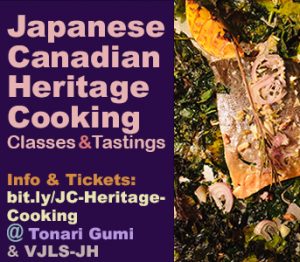Are You a “New World Person” or an “Old World Person”? From where does your sense of “history” begin?

Over the past several years, I’ve been translating so many historical materials on such subjects as Japanese Canadians’ lives up to World War Il, that I’ve lately become somewhat obsessed with the basic question: “What does history mean to us?” I’ve come up with some “answers” which may not be earth-shattering revelations, but are nevertheless fascinating for me. For example, history means something different to the people of the New World (the Americas) from what it means to the people of the Old World (Europe, Middle East, Asia, etc).
Say you are a 60-year-old Canadian – Nikkei or otherwise – and let’s just say your country ‘s origin dates back, arguably, to the Constitution Act of 1867 proclaiming the Canadian Confederation. That’s 146 years ago. So your country is nearly TWO AND A HALF TIMES as old as you are. But let’s say you are a 60-year-old Japanese, living here or back in Japan. Again this is quite arbitrary but let’s just say the “history” of Japan as one nation begins around 604, the year much-revered Prince Shotoku (574- 622) is said to have promulgated a 17-article constitution. That’s about around 1,400 years ago. So your country is at least about TWENTY-THREE TIMES as old as you are.
If real time intervals can be likened to visual time frames, the former person above sees or becomes aware of 140 years’ accumulation of spoken accounts, writings and images, that are all picked up over 60 years of real time existence. The latter, on the other hand, is aware of at 1400 years’ accumulation seen over 60 years of his or her existence. Few of us are historians, so I use “history” above more in the sense of a vague collective notion we share based on everything we’ve heard from parents and others, learned at schools, and read and seen over the years in the ever-diversifying media.
It’s the sense of continuity. Old World peoples like Europeans, Arabs, Indians, Chinese, Japanese, Koreans and others share a sense of long continuity while New World people like Canadians, Americans, Mexicans, Brazilians and others share a sense of shorter continuity. This is an oversimplification, but you get my point. Around Greater Vancouver, for example, how long have European and Asian immigrants been living and working continuously in these streets and buildings amidst the scenic mountains, forests, inlets and rivers? ONLY around 140 years, says I who considers himself, a Japanese born in 1945 and overseas for more than two-thirds of his life, part of the Old World, as many older readers may well feel.
Does that make the New Worlders generally think that they can get big things accomplished in a relatively short period, compared to the Old Worlders who’ve had the same customs and institutions for so long that they think everything, including projects, takes time? The US went to the moon before its 200th anniversary. One Brazilian I discussed this with thought that the Old Worlders saved more than the New Worlders, because the former have simply known more times of hardship.Europeans did fall behind in the early years of information technology development because they first thought it was ridiculous to try and re-invent the human brain.
I felt the sense of continuity first back in 1956 when my family moved to Wimbledon outside London with my father who was a news agency journalist. Through history classes at school and culture in general I absorbed just how the English people were proud of their Roman heritage, England having been a province of ancient Rome from AD 43 to 409, as seen in place names like Chester, Chichester, Doncaster, Leicester, Colchester, etc., the word endings all showing there used to be a Roman military camp (Latin: castra) there.
I felt it again in Rome where my father was posted with family for the 1960 Olympic Games, and where I worked as a correspondent myself from 1967 to 68. Walking around the ancient Roman Forum ruins feeling chariot-wheel ruts on the cobblestones underneath my feet or checking out old market places where people have been buying and selling sundry for hundreds of years. The sense of continuity is in the atmosphere, so to speak.
In Tokyo where I grew up and lived during high school and college years and from 1976 to 81, I never felt that sense of continuity, maybe because it was too familiar, until during a brief visit around 2003. While taking a nostalgic walk near the bank of Tamagawa (River) around where my mother used to take us kids to Tamagawa-en, a fairground long since gone. I happened to read an inscription outside a nearby old shrine on a tree-covered hill, that I’d never looked at before. It said the shrine had been built around 1190 to mark a vow made by wife Masako of powerful shogun Minamoto Yoritomo (1147-99) for her husband’s safety in a battle far off. So for well over 800 years, people have been coming practically every day to worship at this shrine under a canopy of thick foliage. It probably looked and felt the same way back then. I felt a strong sense of continuity.
In the New World of North America, I found that Old World atmosphere in the people and the streets of Montreal, which became a French colony in 1642, and Mexico City, which became a Spanish-ruled city-state around 1535. In both cities, I felt this ethos like “we’ve always been here, where else is there to live?” You feel the same way in New York, which is in a class all by itself, and probably some old New England cities that I’ve never been to. My palate, incidentally, did come across that sense of continuity in the small California town of Sonoma I visited with my family back in 2005. The Mexican refried beans I tasted in this town, the northernmost of the original 21 missions where a Mexican garrison was established in 1836, was the best I ever had.People there must have been cooking beans every day since back then..
Another big question that has always bothered me. When does “history” begin? The 2011 East Japan earthquake and tsunami disaster seems to be in the phase of becoming history, while the earthquake-damaged Fukushima Daiichi nuclear power plant, still spewing dangerous levels of radiation, is still very much an ongoing “story’.” And turning to our personal lives, when does the departure of loved ones ever become “history”?
Lastly, as for the collective history of the Japanese Canadian community, I’ve learned many things from historical materials I’ve been translating. To cite just one, it was the brave and skillful Japanese migrant fishermen who pioneered many of the salmon fishery grounds off B.C. Maybe you knew that already, but things like that are definitely worth re-telling.








